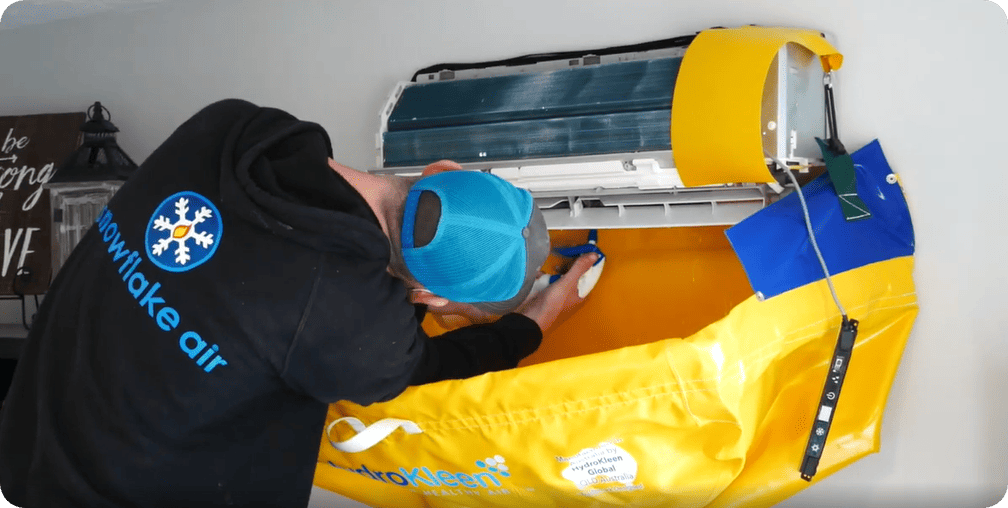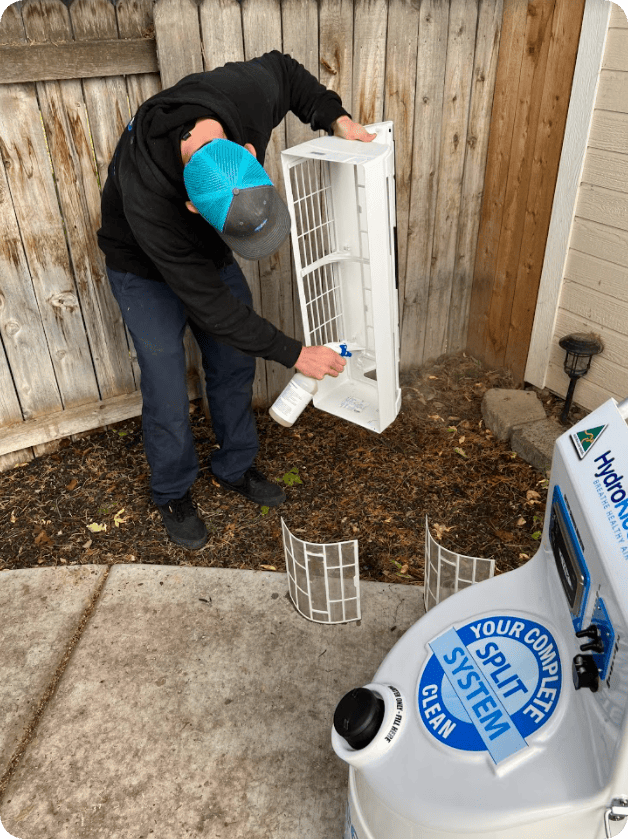Why Does My Mini Split Smell Musty Or Like Cheese Or Dirty Socks?

A mini split giving off a musty smell or an odor like cheese or dirty socks most likely has a mold problem. Spores grow inside the air handler and spread through your home as the system circulates them with the air it’s heating or cooling.
If you’ve ever heard of “Dirty Sock Syndrome,” that’s what we’re talking about here. And, yes, it’s so widespread that it has a name.
And while Dirty Sock Syndrome applies to this problem with any sort of heating and cooling system, we’re here to tell you that, unfortunately, it’s prevalent with ductless systems.
But, the good news is that there’s a quick, easy fix. A mini split deep cleaning can usually take care of this problem in one visit.
That’s our specialty here at HydroKleen208: Restoring ductless systems, so they work just as well as the day they were installed. You’d be surprised at just how dirty the insides of these systems get — and how well they’ll work once you get them cleaned out.
But, we’ll get to all that later on. First, we’ll talk about why ductless systems are so susceptible to mold problems and how to spot an issue. Then, we’ll discuss how to address it.
And, if you have any questions about the ductless system or indoor air quality in your Treasure Valley home or business, call us at (208) 779-5596 for a free consultation.
Why (And How) Ductless Systems Get Mold In Them
It turns out that mini splits — particularly the air handlers — are perfect breeding grounds for mold.
There’s no light in there, but there’s plenty of warmth from the heat transfer process, plus moisture from the air and from the dehumidification process in the summer.
Those are the exact optimal conditions for mold growth. Then, to make matters worse, these units are really tough to clean.
Mold On Ductless Coils
Even if you’ve only lifted the front panel on your air handlers to clean the filter, you can get a sense of how packed everything is in there. And, in particular, you’ll see the coil: that blue block with all the tiny ridges on it.
That’s the main offender when it comes to mold.
Mold spores, along with bacteria and other microbial contaminants, settle in between those tiny ridges and cultivate. Since that’s where the heat transfer occurs, there’s plenty of warmth and moisture.
Other areas ripe for problems are behind the barrel fans or near the drain line if there’s a problem.
Related: How To Spot And Fix Mini Split Condensate Drain Line Clog
These problems take root in just about any system. But, the infestations get even worse if the system wasn’t installed properly. We start to see water building up in the air handler or leaking behind the walls.
Cleaning Challenges

Not only does mold grow quickly inside these units, but they’re also tough to clean out. For instance, we mentioned the barrel fans and the condensate line – you can’t even see those without taking the air handler apart! And, there’s more in there as well.
So, until recently, the only way to clean this stuff was to have a professional disassemble every component. Then, they’d have to scrub each piece manually.
It’s a delicate, time-consuming process. Each one could take hours. As a result, it’s usually hard to find an HVAC contractor that will do it. The price would be prohibitive when you factor in the labor hours.
Then, there’s still no guarantee they can eliminate the problem! Look at the coil again. Now, imagine having to scrub in between every one of those tiny fins without bending any.
You’ll get some cleaning when you get a tune-up or regular maintenance. But that only scratches the surface.
Dirty Sock Syndrome
All these factors lead to what’s called “Dirty Sock Syndrome.” All that junk building up in your system — especially mold — gives off a stale, cheesy smell. Then, the odor circulates through your house as the air flows through the system.
It can — and does — occur in forced-air systems (think furnaces and central air). But, it’s much more common with mini splits.
At best, it’s an inconvenience (and maybe a little embarrassing when you have people over). At worst, it can make you feel sick.
Related: Six Telltale Signs Your Ductless System Needs To Be Cleaned ASAP
Mini Split Deep Cleaning
 A general HVAC tune-up and cleaning will eliminate dirty sock syndrome if you’re lucky. But, if you have a ductless system, it’s essential to add a dedicated mini split deep cleaning to your strategy. In fact, these cleanings are important even if you don’t notice a bad smell yet.
A general HVAC tune-up and cleaning will eliminate dirty sock syndrome if you’re lucky. But, if you have a ductless system, it’s essential to add a dedicated mini split deep cleaning to your strategy. In fact, these cleanings are important even if you don’t notice a bad smell yet.
Related: How Often Should A Mini Split Be Cleaned?
We mentioned before how difficult it is to clean these systems properly. That’s if you’re doing it manually. HydroKleen208 has a specialized process that makes flushing out these systems easy and effective.
In this article, you can read more about how we work and get a behind-the-scenes look at an actual cleaning.
The bottom line is that our parent company, HydroKleen Global, developed specialized tools, processes, and non-toxic cleaning agents that can reach into every nook and cranny in your system and clean it out.
That includes the air handlers along with the heat pump outside.
Since we do it without taking anything apart, it’s much less expensive than a conventional HVAC visit. And, our finely-calibrated equipment uses just the right amount of pressure to wash everything without causing damage.
Related: What Does It Cost To Clean A Heat Pump?
This doesn’t take the place of regular maintenance or tune-ups. Instead, it works along with those services to help keep you healthy and keep your system running great.
If you live or work in Kuna, ID, or anywhere in Idaho’s Treasure Valley, you can call HydroKleen208 to learn more about our mini split cleaning. We serve homes and businesses from Boise Metro and as far north as Cascade. Click below or call (208) 779-5596 to set your appointment.
